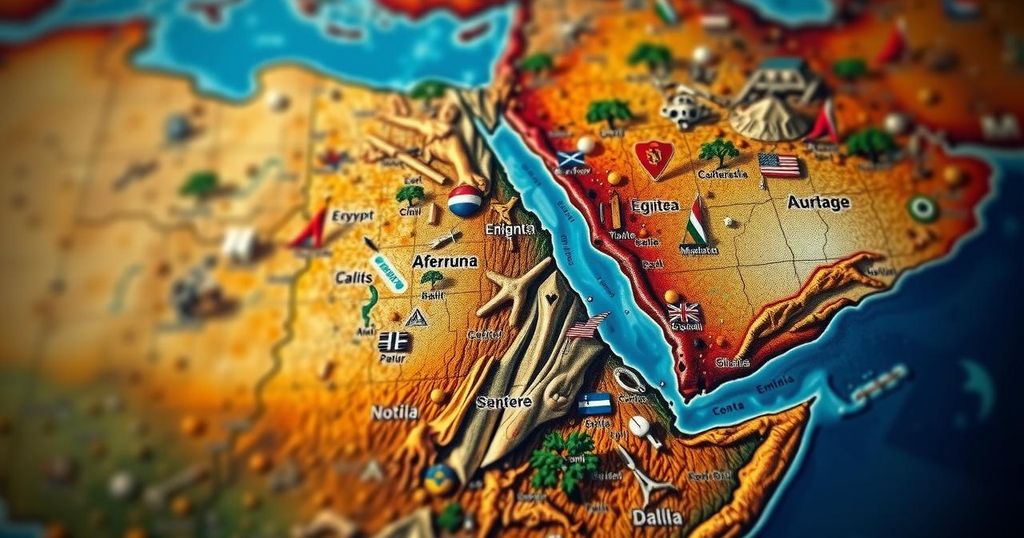A trilateral summit involving Egypt, Eritrea, and Somalia marks a significant geopolitical shift in the Horn of Africa, aimed primarily at encircling Ethiopia amid growing tensions over regional security and water politics. The alliance highlights Egypt and Somalia’s military cooperation as Ethiopia’s influence wanes, emphasizing the critical nature of diplomacy and international engagement for Ethiopia as it navigates these changing dynamics.
The recent trilateral summit held in Asmara, Eritrea, involving leaders from Egypt, Eritrea, and Somalia, has precipitated a notable transformation in the geopolitical landscape of the Horn of Africa. This gathering aimed to establish a collective stance in light of prevailing regional security dilemmas, with Ethiopia occupying a critical focus as a neighboring nation embroiled in various tensions. While the summit was purportedly convened to foster cooperation among the three nations and bolster regional autonomy, beneath this façade lies a strategic initiative to encircle Ethiopia. The trio—Eritrea’s Isaias Afwerki, Egypt’s Abdel Fattah al-Sisi, and Somalia’s Hassan Sheikh Mohamud—convened to underline the significance of territorial integrity against external influences. Historically, the Horn of Africa has witnessed intricate alliances shaped by long-standing grievances, often centering around Ethiopia. The country’s controversial agreements with Somaliland and its contentious relationship with Egypt regarding the Grand Ethiopian Renaissance Dam fortify its centrality in regional dynamics. Notably, the proposed naval access for Ethiopia to a coastal section of Somaliland has exacerbated existing tensions with Somalia, which still challenges Somaliland’s autonomy following its secession in 1991. Somalia’s recent military accord with Egypt, complemented by the provision of military resources from Cairo for combating the al-Shabaab insurgency, illustrates a strategic pivot towards strengthening ties with Egypt. This evolving relationship underscores Ethiopia’s waning influence amidst an emboldened Cairo-Mogadishu connection. Although Ethiopia was not specifically addressed, it was evident that concerns surrounding its actions in the region were paramount to the summit discussions. The enduring rivalry between Egypt and Ethiopia surrounding the Grand Ethiopian Renaissance Dam remains a substantial source of tension, as Egypt perceives the dam as a significant threat to its water resources. The implications of Egypt’s military engagement in Somalia further complicate the regional panorama, as Egypt aspires to quell Ethiopia’s escalating influence. Eritrea, with its authoritarian backdrop and ambition for regional prominence following its independence from Ethiopia, is leveraging its strategic location near vital maritime routes to bolster this partnership with Egypt and Somalia. The Asmara summit signals a potential realignment of power dynamics, positioning Egypt, Eritrea, and Somalia to assert military and regional control against Ethiopia’s rising dominance. The implications of this unfolding alliance raise critical questions regarding the Horn of Africa’s stability. Egypt’s involvement, despite not sharing borders with these nations, could suggest a looming proxy conflict with Ethiopia, particularly with Eritrea’s historical enmity towards the Tigrayan People’s Liberation Front. This potentially volatile environment portends an era where increased aggression may manifest through border conflicts and extremism targeting Ethiopia from Somali-based groups. In this landscape of shifting allegiances, Ethiopia must engage in proactive diplomacy, seeking dialogue both with Egypt and Eritrea while also galvanizing international support, notably from the United States. Furthermore, Ethiopia’s endeavor to solidify partnerships with neighboring countries such as Kenya and Sudan may facilitate a strategic counterbalance to this emerging axis. Implementing a framework for Nile water management could also serve as a constructive step towards alleviating tensions, alongside efforts to clarify Ethiopia’s strategic intentions. In a region characterized by fragility, Ethiopia’s navigation of these alliances will significantly influence its future stability and security.
The Horn of Africa has long been a region marked by instability, complex alliances, and historical grievances. The recent shift in alliances, particularly involving Egypt, Eritrea, and Somalia, signifies a noteworthy change in the geopolitical dynamics that have traditionally centered around Ethiopia. This situation is further complicated by Ethiopia’s controversial dealings with Somaliland and its contentious relationship with Egypt, rooted in water rights over the Nile. Consequently, the region’s historical background is essential for understanding the motivations behind the recent summit and its implications for regional stability.
The recent summit among Egypt, Eritrea, and Somalia signals a critical shift in the geopolitical alliances of the Horn of Africa, aiming at encircling Ethiopia amidst ongoing regional tensions. This gathering reflects not only shared interests in security but also a strategic maneuver to assert influence over Ethiopia’s expanding reach. As alliances evolve, the trajectories of these nations will determine the region’s stability, necessitating Ethiopia’s engagement in diplomatic efforts to mitigate emerging threats while recalibrating its own international relationships.
Original Source: thehill.com







